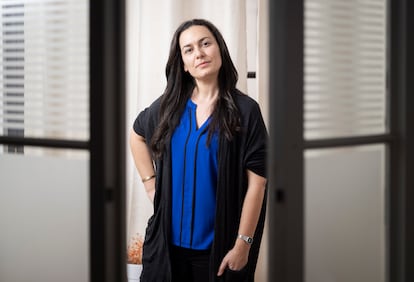Alicia Álvarez, psychologist: ‘We will all experience events that can be traumatic, but not all of us will develop trauma’
The mental health specialist has published a book in which she explores post-traumatic stress as a reality that is more frequent than we think

In her book ¿Cuánto pesa tu mochila? (How heavy is your baggage?), by the Barcelona-born psychologist Alicia Álvarez, trauma appears as a fairly common experience, and not one that is necessarily associated with the kind of natural disasters that make the news or even with personal tragedies. “We are all susceptible to developing trauma at some point, because we are all going to go through potentially traumatic events,” says Álvarez, who is the director of care and research at the Barcelona Trauma, Crisis and Conflict Unit of the Autonomous University of Barcelona (UAB).
Although the possibility of trauma is everywhere, it has been seen that the number of people with post-traumatic stress does not increase after major catastrophes, such as the 9/11 attacks. “What determines whether you develop trauma is the subjective experience; it is not only influenced by the event itself, it depends on how you experience the event and how you manage it,” she notes.
Question: Why does trauma emerge?
Answer. When we talk about trauma, we are referring to post-traumatic stress. The most interesting thing is what goes wrong when we experience a potentially traumatic situation. Our amygdala [a small structure in the brain related to emotions] reacts in a very intense way, because it detects a great danger for us. So, it starts collecting a lot of data from the environment, because the job of our amygdala is like that of our fire alarm. It is in charge of warning us when there is danger and when there is not, and it can do this because our brain has already stored a lot of information so that it knows if something is going to be dangerous.
What happens when something is overwhelming us is that the amygdala becomes very active, because it wants to collect a lot of information to be prepared for the next time something like that happens again. This overactivation of the amygdala makes it difficult for the hippocampus to work. The hippocampus has many other functions, but one is to store in our memory the things we experience. It is as if it were dedicated to binding books of the things that happen to us and then sending them to a library in the frontal lobe. Because the amygdala is collecting so much information, the hippocampus becomes saturated and cannot do its job.
People with trauma lose track of time, they have trouble pinpointing events, and they get stuck in that traumatic moment. From then on, your entire temporal location is altered. It’s a bit like the binding process is interrupted and the book doesn’t end up on the shelf and, instead of having tidy floors, everything is strewn about. And if this is the case, you keep tripping over things. The fact that the hippocampus cannot fix the memory and organize it means that, from time to time, we get images or thoughts of what happened. Re-experiencing is one of the major symptomatic areas of trauma and what it implies is that the person is reliving the same thing over and over.
Q. They keep remembering what they experienced.
A. It’s not that they remember it, they are reliving it. In fact, using brain imaging techniques, it has been seen that the areas of the brain that are activated are the same as if they were really experiencing the event at that precise instant. The brain areas of memory are not being activated, it’s the brain areas of experience that are activated. So these people experience the same thing all over again, the same anguish as the day when it happened to them.
Q. How do these people usually handle this?
A. This is scary and we think, well, I’m going to avoid everything that might remind me of what happened, without realizing that, since it’s not a memory, avoiding people, places or situations that could be related to the event only makes the symptoms worse. This is the second major sphere of trauma symptoms: avoidance. We begin to isolate ourselves, we socialize less, we are less communicative. And because we avoid, our brain cannot learn. One of the things we told people affected by the attacks on the Rambla in Barcelona when we were treating them was that, although at that moment it seemed unthinkable, we were going to work on strategies so that they could return to the Rambla. Work to be able to control this discomfort and for your brain to learn that you can return to that place and that nothing will happen. If not, you will stay in that loop of danger and you will begin to live in a constant state of insecurity.
Otherwise, we start to become more irritable, we are on hyper-alert, we cannot sleep, everything upsets us, a door slams and we jump, an ambulance passes by on the street and gives us a start... We are constantly looking over our shoulder, hyper-activated. And all this causes a chain reaction in our brain and our nervous system, which has all kinds of effects, including at a physical level and in terms of disease.
Q. In the book you provide a figure, stating that nine out of 10 people will have at least one traumatic experience in their life and three out of 10 will have four or more. These figures give the impression that everyone might be ill and in need of treatment.
A. The point is that we will all experience events that may be traumatic, but not all of us will develop trauma. And we can develop trauma but be more or less intensely affected by it. If we really have post-traumatic stress, it will be diagnosed by a professional. What will lead us to that professional? Our level of discomfort. But this is like when something hurts. If you have a slight headache, perhaps you will take measures yourself or you might wait for it to go away. If it already bothers you a lot in your day-to-day life, that can lead you to a professional. With trauma, I think we are not aware that there are things that condition our day-to-day life, or that cause us some discomfort, and could be resolved.
Q. Do people usually go to a psychologist thinking they have a trauma?
A. We are not a country that has a culture of going to a psychologist. We are not used to going to a professional and saying: “Look, lately I notice that I get very angry and I don’t know why.” Or: “I feel lonely even though I normally have a lot of friends and I socialize, I feel alone and I don’t know what’s wrong with me.” We don’t have a culture of doing that.

Q. But there is also a practical issue, because there is not much availability of psychologists in the public healthcare system...
A. In our public healthcare system, one thing that is done well is diagnosis. At the very least, we all have access to that. I wonn’t go into the issue of waiting lists, which also depend on the area and is a problem we also have with other pathologies. It is true that there is a lack of professionals to care for so many people who need it, although there are great professionals who are very well trained.
Q. In the book you talk about relationship problems as a common source of trauma.
A. As in any relationship where there is an intense emotional bond, there can be interactions that can generate trauma. The same happens with reference figures, such as parents. These are relationships of great intimacy, with a lot of connection, and they can also be sources of great pain. They are relationships in which things can happen that attack the way we see ourselves and, at a certain moment, we can digest it badly and end up developing a trauma.
Q. Because of the importance of intimate relationships, many parents may be afraid that if they do anything, even if it seems insignificant, they may cause trauma to their children.
A. [Psychiatrist] Jorge Barudy says that the perfect parents don’t exist, that we have to try to be good enough. We’re going to make mistakes, we’re going to fail, we’re going to do things that will hurt our child without meaning to. It’s about being aware, being able to ask for forgiveness, being coherent, sensitive, knowing how to set limits. For many years I have worked in child protection and one of the important things is that children must feel that they are important to their role models, that their role models love them unconditionally, that even if they break something, get bad grades, or mess things up, their parents will still love them.
Q. You say that when something bad happens to someone, they feel worse when they think it’s someone else’s fault, rather than if they think it’s a fatality, that it’s no one’s fault. The media often look for someone to blame for misfortunes, even when we’re talking about a natural disaster. Does that increase the risk of victims ending up with post-traumatic stress?
A. When faced with a potentially traumatic event, there are many risk and protective factors, because the same event does not cause trauma to everyone who experiences it. I am more at risk of developing trauma if someone stabs me than if a branch falls on my head. It all depends on how much your sense of control and security is broken. We all assume that life works in a certain way, there is a bias that life is fair. We believe that if we do what we have to do, nothing bad will happen to us. The more that rule is broken, the greater the risk you have of developing trauma. When our sense of control disappears, the world seems hostile to us.
Sign up for our weekly newsletter to get more English-language news coverage from EL PAÍS USA Edition
Tu suscripción se está usando en otro dispositivo
¿Quieres añadir otro usuario a tu suscripción?
Si continúas leyendo en este dispositivo, no se podrá leer en el otro.
FlechaTu suscripción se está usando en otro dispositivo y solo puedes acceder a EL PAÍS desde un dispositivo a la vez.
Si quieres compartir tu cuenta, cambia tu suscripción a la modalidad Premium, así podrás añadir otro usuario. Cada uno accederá con su propia cuenta de email, lo que os permitirá personalizar vuestra experiencia en EL PAÍS.
¿Tienes una suscripción de empresa? Accede aquí para contratar más cuentas.
En el caso de no saber quién está usando tu cuenta, te recomendamos cambiar tu contraseña aquí.
Si decides continuar compartiendo tu cuenta, este mensaje se mostrará en tu dispositivo y en el de la otra persona que está usando tu cuenta de forma indefinida, afectando a tu experiencia de lectura. Puedes consultar aquí los términos y condiciones de la suscripción digital.









































